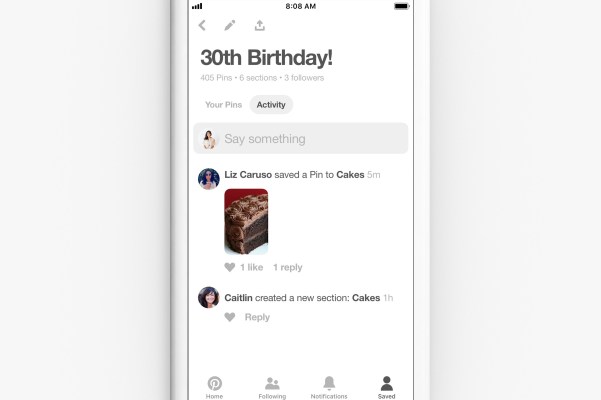Pinterest is trying to further tap its popularity as a place to plan events, this time adding ways for users to collaborate across boards that are baked directly into the app.
Group boards will have their own designated feed, where users will be able to communicate with others collaborating on that board and also get updates on new member additions or added pins. There are also the other typical social structures you’d expect on an app these days, including @-mentions or liking comments. It’s another step to get people onto Pinterest and sticking around as they look to plan events, and create more ways to make the platform more and more sticky. It’s also another quality-of-life improvement that Pinterest seems to have needed for quite some time.
It’s those kinds of events — weddings, parties and others — that propelled Pinterest initially to become one of the larger social networks in the early 2010s. The company late last year said it had more than 200 million monthly active users, which while small compared to the likes of Instagram or Facebook, serves as a hub for a different kind of user behavior than you might find on those other platforms. The majority of the content on Pinterest is high-resolution products from businesses, where people will search for or save those products as they look to plan future life events.
Pinterest has tried to position itself as one of the best ways to discover new ideas, whether that’s stumbling upon something in a primary feed or finding something through searching. Over time, it’s added more and more tools to try to get people to come back more regularly, and if it continues to improve those recommendation engines, it can continue to run that feedback loop and keep users more and more attached to the platform. Adding a sort of light social pressure from friends that are sharing ideas and looking for feedback is one way to do that, in addition to it generally being useful.
All that is good for its pitch to advertisers as well. Pinterest, in addition to trying to cater to that unique kind of user behavior, is also trying to sell itself to advertisers as a platform where they can reach potential customers through ways they wouldn’t be able to with primary advertising channels like Facebook or Google. By making the platform more sticky, it can go back to those advertisers and offer them better engagement metrics and show that users stick around and are paying closer attention to content on Pinterest, which can in turn drive that additional value to advertisers.
